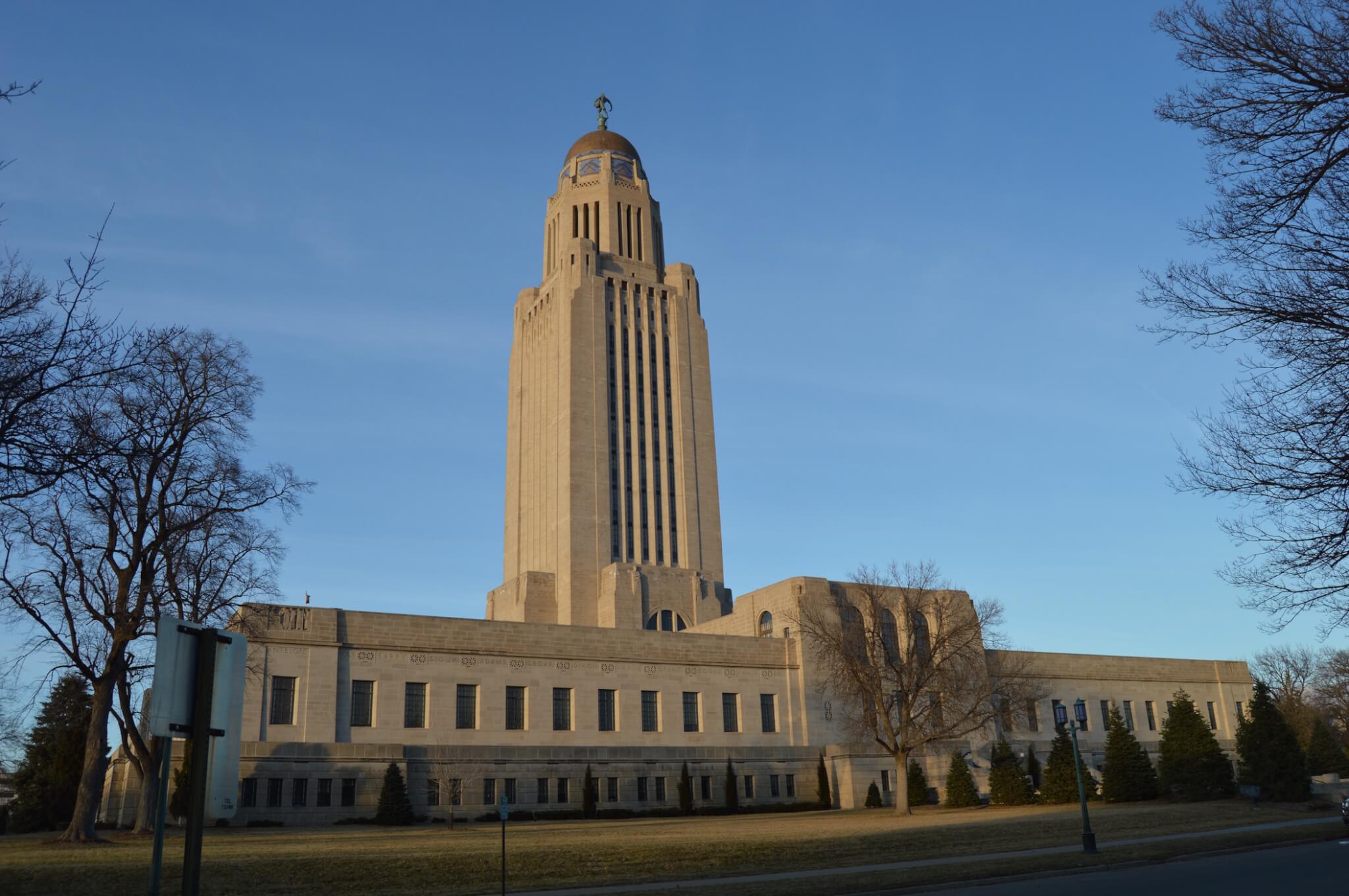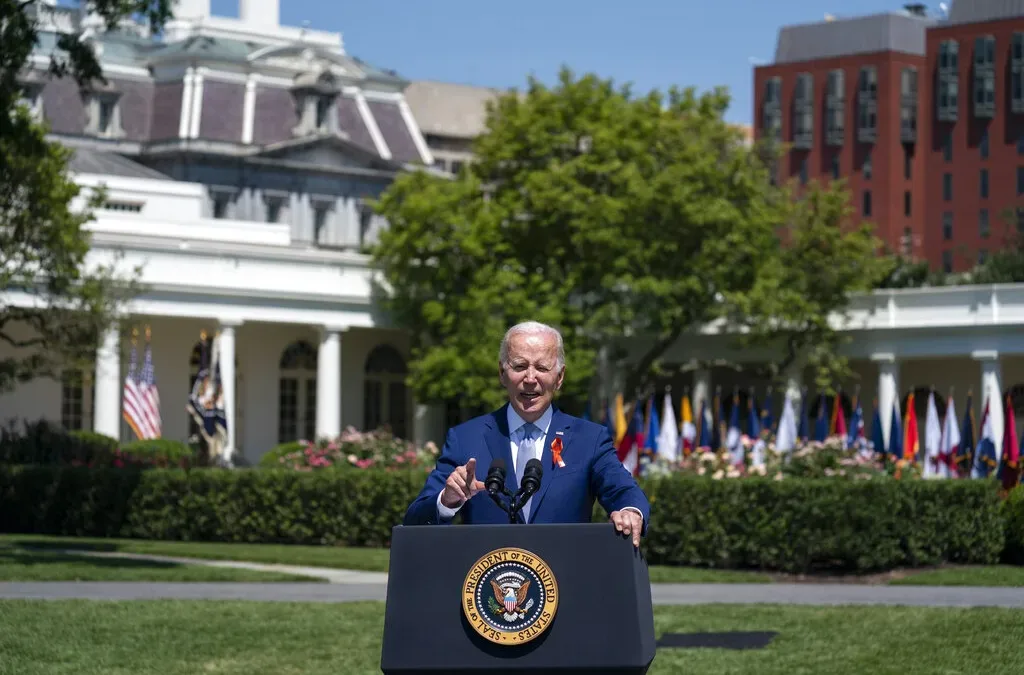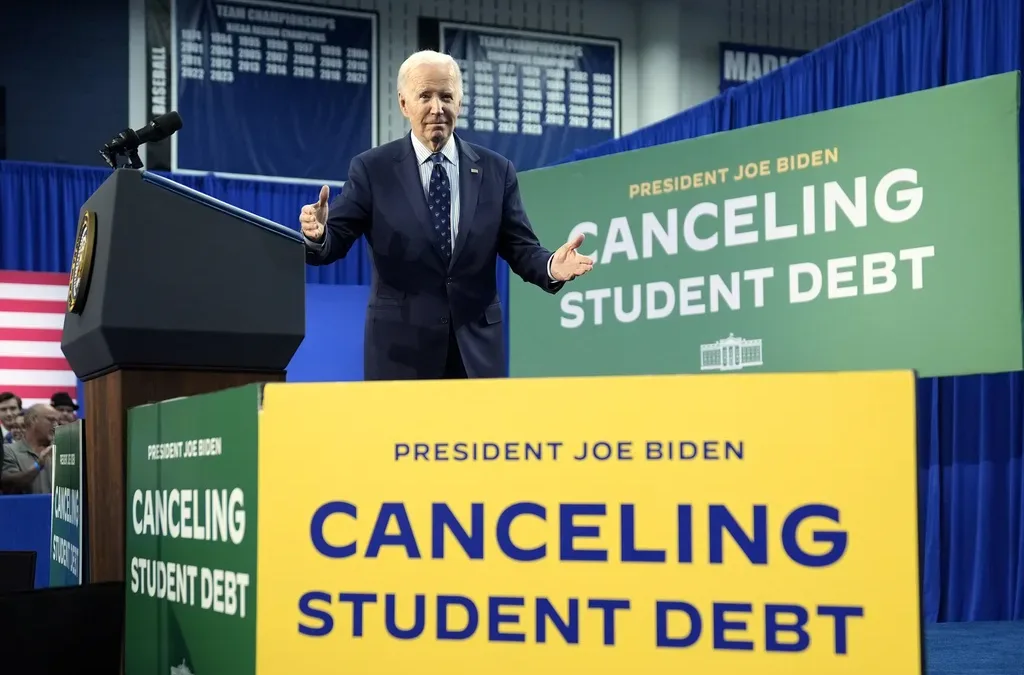
As the Democrats’ nominating race looks to go the distance, the campaigns of Hillary Clinton and Bernie Sanders now turn their sights to the many contests beyond the first four states. 30 states and territories in all will choose their delegates for the Democrats during March. The first major test comes on the March 1st Super Tuesday, when many southern states, along with places like Colorado, Minnesota and Massachusetts, vote and caucus. The following Saturday on March 5th the three states of Kansas, Nebraska and Louisiana go.
Starting Line is traveling to many of the Midwestern states surrounding Iowa to cover parts of their primaries and caucus. We’re currently on a five-day swing through Nebraska and Kansas, which both hold caucuses.
How The Nebraska Caucus Came To Be
Until 2008 Nebraska held its contest for the presidential primary during their regular mid-May primary. The nominations were always sewn up by then, so they never saw much activity in the Cornhusker state. But in 2007, knowing that an open presidential seat would likely ensure a competitive primary, Nebraska Democratic Party chair Vince Powers saw an opportunity to move his state up.
“I suggested a caucus, and it was a very, very close decision by our state central committee,” Powers recalls, adding that the Republicans decided to stick to their own May primary. “We went into it with great concerns, no one was really sure what would happen. But in 2008 we came on the Saturday right after Super Tuesday, it was a huge success, and it led directly to Nebraska giving an electoral vote to President Obama [Nebraska awards some of its electoral votes by Congressional district; the Omaha-based one went for Obama].”

Nebraska Democrats chair Vince Powers at Lancaster Democrats fundraiser
The 2008 caucus proved to be rather chaotic in some places, as turnout (38,000 voters in all) surpassed the local parties’ predictions, and all were unaccustomed to the caucus process. Sarpy County, the state’s third-most populous county south of Omaha, held their caucus location all at one high school. The state highway patrol had to close down the interstate due to the massive traffic from the turnout.
Despite the problems, Democrats in the state were ecstatic to finally have a big say in the national primary, and that goodwill offset any frustrations. It brought out a lot of new volunteers that stayed in the party afterward. Many were also excited over the attention they got from how well Barack Obama did in Nebraska, beating Clinton two-to-one in the caucus.
“By having a moderate to conservative Democratic Party vote for him two-to-one, the national reporters I read said, ‘wow, maybe he’s not this liberal, look, he’s Nebraska,'” Powers notes.
The Democrats decided to hold a caucus again in 2012, despite there being no real campaign, and voted again to host one in 2016.
How It’s Organized
“It won’t be perfect, but it will be great.”
That’s been Powers’ oft-repeated expectations motto for the coming caucus. With another highly-competitive presidential contest, and a wide range of caucus formats around the state, most party activists and leaders are just hoping for as orderly a caucus as possible.
As with all caucus states, Nebraska has a rather unique setup for theirs. Each county can hold their caucus at a different time, anytime between 10:00 AM and 8:00 PM. Douglas County (Omaha) goes in the morning, while Lancaster County (Lincoln) is in the evening. The counties also decide how they divide up their caucus. Douglas holds a caucus in each legislative district, Sarpy has three locations this year, Lancaster is the only one that does it by actual precinct level, and many others simply have one county-wide location. That might make things interesting in places like Hall County (home to Grand Island), where a 60,000 population county gathers in one place.
But not all Nebraskans who caucus will be physically present at their site. The Nebraska Democratic Party has an absentee option for those who can’t attend that night. Starting Line will cover this topic in a separate post tomorrow.
Nebraska has 17 delegates that will be won at the Congressional District level, and five at the statewide level. The 1st and 2nd Congressional District (the Omaha-based one and the Lincoln-based one) allocate six delegates each. The 3rd Congressional District, which covers rural western Nebraska, has five. That could make that area particularly competitive, as the campaigns will vie to get a 3-2 advantage in delegates in case the others split evenly. The five statewide delegates will be given proportionally to how the candidates do statewide.

Nebraska’s Congressional District map
The Presidential Campaigns Arrive In Force
For a state not used to the attention of the presidential race, activists and voters here are excited for the chance to matter once again. At the Lancaster County Democrats’ fundraiser on Saturday night, a cheer went up in the crowd when it was mentioned that this was the first time both presidential campaigns had staff present at their dinner.
“We have never had presidential staff at this level in the state,” says Christa Yoakum, a key party activist in Lincoln.
As has been the case in all of the states so far, the Hillary Clinton campaign was on the ground first with staff. Not wanting to make the same mistakes as last time in the caucus states, like when a dozen staffers were sent only at the last minute to Nebraska for the final four days in 2008, they’ve invested early. Three Clinton organizers hit the ground in December and began outreach and volunteer mobilization efforts.

Clinton staff and volunteers prepare to canvass in Omaha
A network of supporters who had begun to self-organize were already in place, some of whom volunteered regularly over at the Council Bluffs office in Iowa. And Clinton herself came to Omaha for an event with Warren Buffet in December, which helped swing many activists early. Chelsea Clinton visited Omaha last week for a campaign event.
“We came into a good bit of infrastructure,” says Kane Miller, Nebraska for Hillary’s state director, who was a regional director for the campaign in Iowa. “We had this Nebraska leadership council all across the state, which weren’t just names on a list … It seemed like the stop Hillary made through here in December with Warren Buffet really did a lot to galvanize folks and get them tuned in. When I got here they were primed and ready.”
Several days after the Iowa Caucus, a large contingent of Clinton’s Iowa staffers migrated west, including portions of their western Iowa and Cedar Falls/Waterloo teams. Working at first out of the Council Bluffs office, they had an Omaha headquarters open a week after Iowa, and have since opened offices in Lincoln and Hastings. Miller noted they got the best of both worlds: early staff that built personal connections on the ground and experienced caucus veterans coming in from an Iowa victory.

Former Clinton Iowa staff train Nebraska volunteers
The Bernie Sanders team deployed many of their Iowa staffers as well soon after the caucus there, and recently hired Bill Romjue, who ran Chuck Hassebrook’s 2014 Nebraska gubernatorial campaign, as their state director. While the official campaign got a later start than Clinton’s, they were welcomed into the state by a very robust grassroots network that had been organizing since April.
“It’s building off of what they already have,” Romjue explains of what the campaign came into in Nebraska. “Good organizers can come in and take advantage of that by knowing how to guide people for what they want and need to do. A lot of them had already trained for the caucus … It’s really a delight for everyone coming over from Iowa and part of your job is already done when you’ve got here.”

A Battle of the Bands for Bernie event in Lincoln, organized by the grassroots group
“At this point we’re facilitating the paid staff, and sending people to them so they have the information to go door-to-door,” says Linda Anderson, one of the leaders in the Sanders grassroots operation who’s been organizing the state for almost a year.
The Sanders campaign just opened up a Lincoln office near the University of Nebraska campus, to go along with their Omaha headquarters. Many of their volunteers spent a lot of time working across the river in the Iowa Caucus. Their Omaha office was busy on Saturday, with Sanders bumpersticker-clad cars taking up about two blocks of parking down the street. In addition to canvassing and phone banking, one staffer was sent out from the office to mingle with a Black Lives Matters demonstration going on at a nearby highway overpass.

Linda Anderson has been organizing in Nebraska since April 2015
How Nebraska Might Play Out For Clinton and Sanders
After conversations with numerous party activists, elected officials, political consultants and volunteers for both campaigns, a strong consensus emerged on a prediction for who wins the Nebraska Caucus: No one has any idea.
“I think it’s wide open,” says Sanders’ Romjue. “It’s a good state probably for both candidates, so I think it’ll be competitive. I know they’re working hard, and we are too. We got an awful lot of grassroots support, they have a lot of establishment backers.”
“It’s all hand-to-hand at this point,” adds Clinton’s Miller, adding it’s now largely a delegate fight, so they’re approaching each district with that in mind.

13-year-old volunteers for Clinton in the Lincoln office. They met Chelsea Clinton last week
With no public polling, and with only the lopsided results from 2008 impacted by the Clinton campaign’s absence here, it’s difficult to figure out who might have the upper hand, if either does at all. Predictions vary widely across the state.
“I think Bernie Sanders is going to surprise people with his strength in the 3rd CD (western Nebraska),” Powers predicts. “I think Hillary Clinton will do well in Omaha. It’s way too close to call in Lincoln.”
“We are generally an older population,” notes Yoakum, which she thinks helps Clinton, who she supports. “Our younger population is Latinos and immigrants. Hillary has been appealing to them. I think she’ll do well across the state … But it’s kind of hard for me to call.”
Still, many trends in support from earlier states are replicated here.
“You see sort of the same thing in terms of the split of the more-established party activists going toward Clinton, and a lot of the younger students and more progressive activists going toward Sanders,” says Gary DiSalvo, an Omaha-based political consultant. “But there’s enthusiasm on the ground for both of them.”

A giant Sanders puppet in their Omaha HQ
However, one of those elected officials backing Clinton is Adam Morfeld, a young, up-and-coming State Senator from Lincoln (who the local Clinton staff notes is also a pretty good phone banker).
“I strongly believe that Hillary is going to be a person that will represent working families,” Morfeld comments. “She’s someone who has the experience to actually get policies across the finish line. I do represent the university district, so there’s a little bit of blowback there … I think Hillary’s going to do well overall in Lincoln.”

Senator Adam Morfeld, a Clinton endorser
Looking at the demographics throughout the state, some educated guesses can be made from past results.
In north Omaha, Clinton will likely replicate her considerable advantage among African Americans to pull off victories at the caucus sites for Legislative Districts 11 and 13. The same may be true in Legislative District 7 on the south side of Omaha, which contains a decent-sized Latino population. Sanders may rack up delegates in Legislative District 8 in the Dundee neighborhood outside of downtown Omaha, a very liberal, highly-educated enclave in the city.
If demographic trends from Iowa continue, the higher-income Omaha suburbs out west could be good for Clinton as well, while the working class city of Bellevue in Sarpy County could help Sanders.
Lincoln could be a mix. Obviously the students at the University of Nebraska will give Sanders a boost. And the more highly-educated, liberal voters of Lincoln could help him win. But Clinton supporters also see the more established neighborhoods in the city giving the former Secretary of State an advantage.

Sanders supporters in Lincoln
Western Nebraska is anyone’s guess. It was Clinton’s only strong area in 2008, where she split the delegates with Obama. But largely white rural areas are starting to trend toward Sanders in 2016, even with the much older population. And many of those counties are so Republican, that small Democratic turnouts out there could make a difference.
Lessons From Iowa
Nebraska activists and leaders kept a close eye on the Iowa Caucus this year to better prepare for their own. NDP chair Powers hopes to avoid the problems that plagued the reporting around Iowa.
“I hope that one candidate has a lot more than the other,” Powers says. “I don’t want any issues. I don’t care which one, somebody win big!”
The reporting on caucus night will be interesting. Since counties caucus at different times, each county is supposed to send in their results to the state party to be released at the end of the night (they hope to put numbers up around 8:00 or 9:00 PM this year). But in 2008 Douglas County Democrats held a press conference after their morning caucus to announce their results.
The party plans on reporting out the raw numbers of candidate supporters statewide on caucus night.
“Unlike Iowa, we’re all about who’s winning!” Powers emphasizes, seemingly only half-joking.
But there’s also hesitation around the caucus and delegate math. They may take their time with that to ensure they get it correct, rather than release information they have to walk back later.
“We want to make certain that the delegate count is accurate,” Powers says. “If we’re able to give that that evening, we will.”
Powers has also been working hard to tamp down any criticism of the process, doing his best to make it as transparent and open as possible. He’s looking to keep close relations with the Sanders campaign after seeing what their caucus-night grumbling about the Iowa Democratic Party’s preparedness did to the national narrative around Iowa.
“Bill is a sophisticated political consultant, and he knows everybody,” Powers says about Romjue. “Which is good, because Bill also knows, having worked with the state party in 2014, he’s aware we’re volunteers. I would hope we wouldn’t see any of the issues that arose in Iowa. Bill knows who we are.”
Building The Nebraska Democratic Party Longterm
Nebraska Democrats’ biggest hope is that their caucus participation will have long-lasting positive effects after March.
“What I think is great about the caucus is that it’s mobilizing and energizing the Democratic base, not just for the presidential candidates, but for the local candidates like me,” says State Senator Kate Bolz, a legislator from south Lincoln, who hopes many of the new activists that come out will stick around to help down-ballot candidates later.

A first-time phone caller in Sanders’ Omaha office
“This is great for the party,” notes Miller of the Clinton campaign. “Even if we’re just here for four weeks, we’re doing work that’s helping to grow and strengthen the party. That’s going to be good for us as Democrats no matter the outcome of the nominating contest. It’s a good thing that there’s going to be more registered Democrats in Nebraska.”
Yoakum of Lincoln points out that the first thing the Clinton staff asked her when they got on the ground was how they can help the local parties grow.
“That party building aspect is huge to me,” Yoakum says.

Clinton staff talks with a volunteer in Omaha
That’s a large part of why Powers wanted to move Nebraska up in the first place, and he explains that they did get a lot of new people involved in the process because of it.
“I’m hoping the Nebraska Democratic Party will see an infusion of new people, of new blood,” Powers says. “After 2008, unfortunately all the volunteers got burned out in 2009 by Organizing for America by knocking on doors to talk about healthcare as an issue instead of getting involved in electoral politics. We want them involved in the process … If you don’t like how things are being run, come in and run it.”
No matter how the Nebraska Caucus turns out, which candidate leaves here with the most delegates, or how many new volunteers stick around afterward, the voters of Nebraska have certainly found themselves right in the middle of the presidential campaign. That’s got a lot of Democrats very excited to go caucus on March 5th.
by Pat Rynard
Posted 2/22/16
Politics

Biden announces new action to address gun sale loopholes
The Biden administration on Thursday announced new action to crack down on the sale of firearms without background checks and prevent the illegal...

Biden cancels student loan debt for 2,690 more Iowans
The Biden administration on Friday announced its cancellation of an additional $7.4 billion in student debt for 277,000 borrowers, including 2,690...
Local News

No more Kum & Go? New owner Maverik of Utah retiring famous brand
Will Kum & Go have come and gone by next year? One new report claims that's the plan by the store's new owners. The Iowa-based convenience store...

Here’s a recap of the biggest headlines Iowa celebs made In 2023
For these famous Iowans, 2023 was a year of controversy, career highlights, and full-circle moments. Here’s how 2023 went for the following Iowans:...





